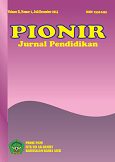DESAIN MATERI AJAR BERBASIS LOGIKA KOMPUTASI DALAM BENTUK BUKU SAKU
DOI:
https://doi.org/10.22373/pjp.v11i2.13760Keywords:
Teaching Materials, Pocket Books, Computational LogicAbstract
Student logic is an approach that makes it easy and can be used by teachers to implement meaningful learning and train critical thinking skills in presenting the text of the observation report. With this computational logic-based pocket teaching material, the researcher hopes that learning to present the text of the observation report will be more effective and creative and innovative because the computational learning approach involves students and can increase critical and independent thinking in learning to obtain information and meaningful learning experiences. Expert test results obtained a score of 80%. The results of small-scale testing obtained a score of 90%. The conclusion obtained from this study is that the teaching material of the text of the observation report based on computational logic in the form of a pocket book to develop self-reliance in learning to appreciate is included in the appropriate category.
References
Agustien, Aliv Via. 2014. Pengembangan Buku Saku Sebagai Bahan Ajar Akuntansi Pada Pokok Bahasan Jurnal Penyesuaian Perusahaan Jasa Kelas XI IPS SMA Negeri 18 Surabaya. Skripsi tidak diterbitkan. Surabaya: JPA FE UNESA Surabaya.
Dalton, Stephanie Stoll. 2017. Pengajaran yang Efektif bagi Semua Pebelajar. Jakarta:Indeks.
Departemen Pendidikan Nasional. 2008. Panduan Bahan Ajar, Jakarta: Depdiknas
Hendratno. 2016. Pengembangan Bahan Ajar Teks Naratif Cerita Rakyat Berbasis Karakter Judikatif di Sekolah Dasar. Universitas Negeri Surabaya: Program Pascasarjana. Program Studi Pendidikan Bahasa dan Sastra.
Kemp, Jerrold E. 1995. Instruction Desigen: A Plan for Unit and Course Development. Belmon: Feron;
Keraf, Gorys. (2010). Argumentasi dan Narasi. Jakarta. Gramedia.
Meikahana, Ranintya dan Kriswanto, Erwin Setyo. 2015. Pengembangan Buku Saku Pengenalan Pertolongan Perawatan Cedera Olahraga untuk Siswa Sekolah Menengah Pertama. Jurnal Ilmu Keolahragaan, Volume 11 (1) Jakarta: Kencana Prenada Media Group,
Nurseto, Tejo. (2011). “Membuat Media Pembelajaran yang Baik”. Jurnal Ekonomi & Pendidikan, Volume 8, Nomor 1: halaman 19-35.
Nuzula, Elvira Firdausi. 2013. Pengembangan Buku Saku Volume Kubus, Balok, dan Limas sebagai Media Pembelajaran untuk Siswa SMP, (Online), vol 6(3).
Panen, P., dan Purwanto. 2004. Penulisan Bahan Ajar. Jakarta: Ditjen Dikti Depdikbud.
Riduwan. 2009. Skala Pengukuran Variabel-Variabel Penelitian. Bandung: ALFABETA.
Rijal, F. (2015). Peningkatan Hasil Belajar Siswa Melalui Pendekatan Contextual Teaching And Learning Pada Konsep Tumbuhan Hijau Di Kelas V MIN Tungkob Aceh Besar. PIONIR: Jurnal Pendidikan, 4(2).
Rijal, F. (201). PENGGUNAAN MEDIA AUDIO VISUAL DALAM PENINGKATAN HASIL BELAJAR MATERI RUKUN IMAN PADA SISWA KELAS I SD NEGERI 49 KOTA BANDA ACEH. PIONIR: Jurnal Pendidikan, 7(1).
Ruhimat, 2011. Kurikulum dan Pembelajaran. Jakarta. PT Raja Grafindo Persada;
Sanjaya, Wina. 2007. Strategi Pembelajaran Berorientasi Standar Proses Pendidikan.
Setyono, dkk. 2013. Pengembangan Buku Saku Materi Pemanasan Global untuk SMP. Unnes Journal of Biology Education. Volume 4 (1).
Wuryaningrum, A. 2007. Pengaruh Teknologi Informasi Terhadap Kinerja Individu Dengan Kepercayaan Dan Kompleksitas Sistem Sebagai Moderating Variable. Skripsi. Malang: Universitas Brawijaya.
Downloads
Published
Issue
Section
License
- Authors retain copyright and grant the journal right of first publication with the work simultaneously licensed under a Creative Commons Attribution License that allows others to share the work with an acknowledgment of the work's authorship and initial publication in this journal.
- Authors are able to enter into separate, additional contractual arrangements for the non-exclusive distribution of the journal's published version of the work (e.g., post it to an institutional repository or publish it in a book), with an acknowledgment of its initial publication in this journal.
- Authors are permitted and encouraged to post their work online (e.g., in institutional repositories or on their website) prior to and during the submission process, as it can lead to productive exchanges, as well as earlier and greater citation of published work (See The Effect of Open Access).

